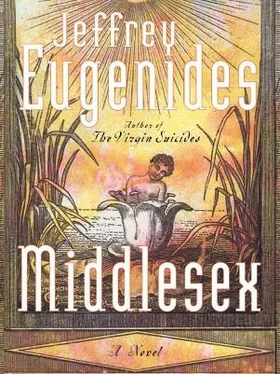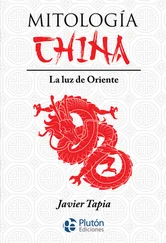“Since you won’t show me your work,” I said as we sat down, “can you at least tell me what it is?”
“Photography.”
“You probably don’t want to tell me of what.”
“Let’s have a drink first.”
Julie Kikuchi is thirty-six. She looks twenty-six. She is short without being small. She is irreverent without being crude. She used to see a therapist but stopped. Her right hand is partly arthritic, from an elevator accident. This makes it painful to hold a camera for a long period. “I need an assistant,” she told me. “Or a new hand.” Her fingernails are not particularly clean. In fact they are the dirtiest fingernails I have ever seen on such a lovely, wonderful-smelling person.
Breasts have the same effect on me as on anyone with my testosterone level.
I translated the menu for Julie and we ordered. Out came the platters of boiled beef, the bowls of gravy and red cabbage, the knödels as big as softballs. We talked about Berlin and the differences between European countries. Julie told me a Barcelona story of getting locked in the Parque Güell with her boyfriend after visiting hours. Here it comes, I thought. The first ex-boyfriend had been summoned. Soon the rest would follow. They would file around the table, presenting their deficiencies, telling of their addictions, their cheating hearts. After that, I would be called on to present my own ragged gallery. And here is where my first dates generally go wrong. I lack sufficient data. I don’t have it in quite the bulk a man of my years should have. Women sense this and a strange, questioning look comes into their eyes. And already I am retreating from them, before dessert has been served . . .
But that didn’t happen with Julie. The boyfriend popped up in Barcelona and then was gone. None followed. This was surely not because there weren’t any. This was because Julie isn’t husband-hunting. So she didn’t have to interview me for the job.
I like Julie Kikuchi. I like her a lot.
And so I have my usual questions. What does she want from? How would she react if? Should I tell her that? No. Too soon. We haven’t even kissed. And right now, I’ve got another romance to concentrate on.
* * *
We open on a summer evening in 1944. Theodora Zizmo, whom everyone now calls Tessie, is painting her toenails. She sits on a daybed at the O’Toole Boardinghouse, her feet propped up on a pillow, a pillow of cotton between each toe. The room is full of wilting flowers and her mother’s various messes: lidless cosmetics, discarded hose, Theosophy books, and a box of chocolates, also lidless, full of empty paper wrappings and a few tooth-scarred, rejected creams. Over where Tessie is, it’s neater. Pens and pencils stand upright in cups. Between brass bookends, each a miniature bust of Shakespeare, are the novels she collects at yard sales.
Tessie Zizmo’s twenty-year-old feet: size four and a half, pale, blue-veined, the red toenails fanning out like suns on a peacock’s tail. She examines them sternly, going down the line, just as a gnat, attracted by the lotion perfuming her legs, lands on her big toenail and gets stuck. “Oh, shoot,” Tessie says. “Darn bugs.” She sets to work again, picking the gnat off, reapplying polish.
On this evening in the middle of World War II, a serenade is about to begin. It’s minutes away. If you listen closely you can hear a window scraping open, a fresh reed being inserted into a woodwind’s mouthpiece. The music which started everything and on which, you could say, my entire existence depended, is on its way. But before the tune launches into full volume, let me fill you in on what has happened these last eleven years.
Prohibition has ended, for one thing. In 1933, by ratification of all the states, the Twenty-first Amendment repealed the Eighteenth. At the American Legion Convention in Detroit, Julius Stroh removed the bung from a Gilded Keg of Stroh’s Bohemian beer. President Roosevelt was photographed sipping a cocktail at the White House. And on Hurlbut Street, my grandfather, Lefty Stephanides, took down the zebra skin, dismantled his underground speakeasy, and emerged once again into the upper atmosphere.
With the money he’d saved from the auto-erotica, he put a down payment on a building on Pingree Street, just off West Grand Boulevard. The above-ground Zebra Room was a bar & grill, set in the middle of a busy commercial strip. The neighboring businesses were still there when I was a kid. I can dimly remember them: A. A. Laurie’s optometrist’s shop with its neon sign in the shape of a pair of eyeglasses; New Yorker Clothes, in whose front window I saw my first naked mannequins, dancing a murderous tango. Then there was Value Meats, Hagermoser’s Fresh Fish, and the Fine-Cut Barber Shop. On the corner was our place, a narrow single-story building with a wooden zebra’s head projecting over the sidewalk. At night, blinking red neon outlined the muzzle, neck, and ears.
The clientele were mainly auto workers. They came in after their shifts. They came in, quite often, before their shifts. Lefty opened the bar at eight in the morning, and by eight-thirty the barstools were filled with men dulling themselves before reporting to work. As he filled their shells with beer, Lefty learned what was going on in the city outside. In 1935 his patrons had celebrated the forming of the United Auto Workers. Two years later, they cursed the armed guards from Ford who had beat up their leader, Walter Reuther, in the “Battle of the Overpass.” My grandfather took no sides in these discussions. His job was to listen, nod, refill, smile. He said nothing in 1943 when talk at the bar turned ugly. On a Sunday in August, fistfights had broken out between blacks and whites on Belle Isle. “Some nigger raped a white woman,” one customer said. “Now all those niggers are going to pay. You wait and see.” By Monday morning a race riot was under way. But when a group of men came in, boasting of having beaten a Negro to death, my grandfather refused to serve them.
“Why don’t you go back to your own country?” one of them shouted.
“This is my country,” Lefty said, and to prove it, he did a very American thing: he reached under the counter and produced a pistol.
These conflicts lie in the past now—as Tessie paints her toenails—overshadowed by a much bigger conflict. All over Detroit in 1944, automobile factories have been retooled. At Willow Run, B-52s roll off the assembly line instead of Ford sedans. Over at Chrysler, they’re making tanks. The industrialists have finally found a cure for the stalled economy: war. The Motor City, which hasn’t been dubbed Motown yet, becomes for a time the “Arsenal of Democracy.” And in the boardinghouse on Cadillac Boulevard, Tessie Zizmo paints her toenails and hears the sound of a clarinet.
Artie Shaw’s big hit “Begin the Beguine” floats on the humid air. It freezes squirrels on telephone lines, who cock their heads alertly to listen. It rustles the leaves of apple trees and sets a rooster on a weather vane spinning. With its fast beat and swirling melody, “Begin the Beguine” rises over the victory gardens and the lawn furniture, the bramble-choked fences and porch swings; it hops the fence into the backyard of the O’Toole Boardinghouse, stepping around the mostly male tenants’ recreational activities—a lawn-bowling swath, some forgotten croquet mallets—and then the song climbs the ragged ivy along the brick facing, past windows where bachelors snooze, scratch their beards, or, in the case of Mr. Danelikov, formulate chess problems; up and up it soars, Artie Shaw’s best and most beloved recording from back in ’39, which you can still hear playing from radios all over the city, music so fresh and lively it seems to ensure the purity of the American cause and the Allies’ eventual triumph; but now here it is, finally, coming through Theodora’s window, as she fans her toes to dry them. And, hearing it, my mother turns toward the window and smiles.
Читать дальше
Конец ознакомительного отрывка
Купить книгу












